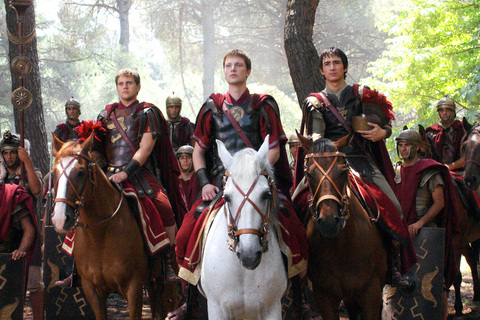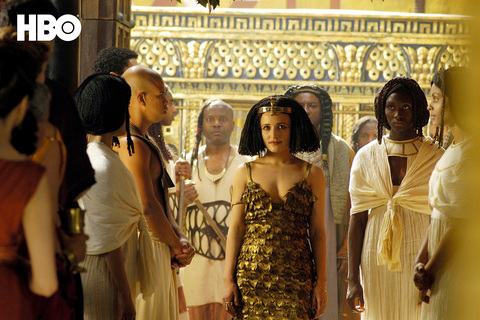The mini-series Rome, an HBO and BBC co-production that boasted some of the highest production values for a made-for-television mini-series, is back for its second, and unfortunately for fans, final season, starting tonight on HBO. BBC costume dramas come in many flavors, but this is certainly not your regular Jane Austin or Anthony Trollop adaptation, for though filled with political and romantic intrigue, it also pushes the boundaries, for a television mini-series at least, of violent and sexual content, occasionally combined.
The first season of the series, released in 2005, took its story from the rise of Julius Caesar, his assumption of absolute power and his assassination by men whose stated object was to preserve the Roman republic. The second season picks up the story from Octavian, Caesar's adopted heir, seeking to claim his inheritance, in the process destroying many of Caesar's erstwhile comrades-in-arms and establishing the Roman empire. But Rome is anything but a dry history lesson, quite apart from the poetic license it takes with the facts. It takes its cue from the Emmy Award winning mini-series I, Claudius (1976), directed by Herbert Wise and staring Derek Jacobi in the title role. This was based on a novel by Robert Graves, who in turn took his story from the classical authors Tacitus and Suetonius, both of whom were writing in the middle of the first century and were masters of the art of muckracking through the lives of the rich and famous.
So Rome carries on in this venerable tradition, throwing in elements from Desperate Housewives and Gladiator to boot. It makes up a mesmerizing concoction.

PHOTOS: COURTESY OF HBO
Attention to detail gives Rome a strong sense of taking place in an historical past, and its treatment of issues like slavery, torture and such is matter-of-fact. This willingness to take risks, to fly in the face of modern sensitivities, also contributes to its contemporary edginess. The producers have seen no need to moralize about life in the ancient world. A benefit of this attitude of calculated callousness is the opportunity to make the most of violence, both sexual and otherwise, to appeal to an audience sated on graphic images of this type. But such is the finesse with which even the most grotesque scenes are managed — with a few reservations about the massed orgy set in the court of Queen Cleopatra — that viewers can sit back and have their lower appetites pandered to without their critical faculties being offended.
That said, the second season does not quite have the freshness of the first, and Ciaran Hinds who played Caesar and Max Pirkis as the young Octavian are both sorely missed. A little too much time is taken to get the show back on the road, but despite, or even because of the elaborate effort to make the second season accessible to newcomers, the early episodes are a tad stogy, especially after the fast pace and high dramatic tension that the first series managed to maintain. But things pick up quickly enough: Octavian is making the running in his imperial ambitions, Mark Anthony is on the back foot, Cleopatra is pushing the limits of how much cleavage can be shown while still wearing clothes, and everyone's favorite centurion Lucius Vorenus (Kevin McKidd) is managing to make a pig's breakfast of family life.
Vorenus and his friend Titus Pullo (Ray Stevenson) are one of the most effective dramatic devices used in Rome, providing a kind of Upstairs, Downstairs dimension to the main story of high politics and military action. Soldiers in the ranks who have proven themselves useful to people in high places, they bring the story down to the level of the street. Vorenus' failure to turn good standing in the army into a position in his local community, Pullo forced to turn to contract killing to make ends meet, both face romantic frustrations that have tragic consequences. As the historical story winds towards its inevitable and well-known end, it is the tale of Vorenus and Pullo that keep the audience wanting more.

As a counterpoint to this swords and smelly sandals aspect of the story, there is also the deadly rivalry between Atia of the Julii (Polly Walker) and Servilia of the Junii (Lindsey Duncan), whose preferred weapons are sex and the barbed remark rather than the sword, and the destruction and death that they bring about is not less than that of the men.
It is the great achievement of Rome that fictional characters such as these manage to establish themselves as integral parts of the story, and while liberties have been taken with history, the historical characters and events are still recognizable, embellished and realized in ways that do not grate against the grain of accepted knowledge.
It is tempting to say that Rome would make an invaluable introduction to this period of history for school children, but given its explicit nature and late time slot, parental discretion is advised. It is worth noting that the version aired on HBO Asia is that approved for Singapore and is likely to have some of the more raunchy scenes of the original removed.
Information on the series can be found on HBO's Web site (www.hbo.com/rome/).

Taiwan Power Co (Taipower, 台電) and the New Taipei City Government in May last year agreed to allow the activation of a spent fuel storage facility for the Jinshan Nuclear Power Plant in Shihmen District (石門). The deal ended eleven years of legal wrangling. According to the Taipower announcement, the city government engaged in repeated delays, failing to approve water and soil conservation plans. Taipower said at the time that plans for another dry storage facility for the Guosheng Nuclear Power Plant in New Taipei City’s Wanli District (萬里) remained stuck in legal limbo. Later that year an agreement was reached

What does the Taiwan People’s Party (TPP) in the Huang Kuo-chang (黃國昌) era stand for? What sets it apart from their allies, the Chinese Nationalist Party (KMT)? With some shifts in tone and emphasis, the KMT’s stances have not changed significantly since the late 2000s and the era of former president Ma Ying-jeou (馬英九). The Democratic Progressive Party’s (DPP) current platform formed in the mid-2010s under the guidance of Tsai Ing-wen (蔡英文), and current President William Lai (賴清德) campaigned on continuity. Though their ideological stances may be a bit stale, they have the advantage of being broadly understood by the voters.

In a high-rise office building in Taipei’s government district, the primary agency for maintaining links to Thailand’s 108 Yunnan villages — which are home to a population of around 200,000 descendants of the Chinese Nationalist Party (KMT) armies stranded in Thailand following the Chinese Civil War — is the Overseas Community Affairs Council (OCAC). Established in China in 1926, the OCAC was born of a mandate to support Chinese education, culture and economic development in far flung Chinese diaspora communities, which, especially in southeast Asia, had underwritten the military insurgencies against the Qing Dynasty that led to the founding of

Artifacts found at archeological sites in France and Spain along the Bay of Biscay shoreline show that humans have been crafting tools from whale bones since more than 20,000 years ago, illustrating anew the resourcefulness of prehistoric people. The tools, primarily hunting implements such as projectile points, were fashioned from the bones of at least five species of large whales, the researchers said. Bones from sperm whales were the most abundant, followed by fin whales, gray whales, right or bowhead whales — two species indistinguishable with the analytical method used in the study — and blue whales. With seafaring capabilities by humans